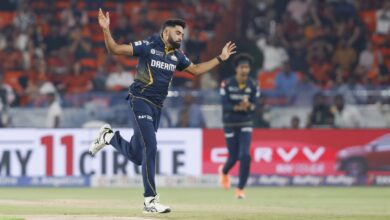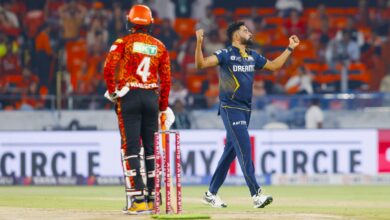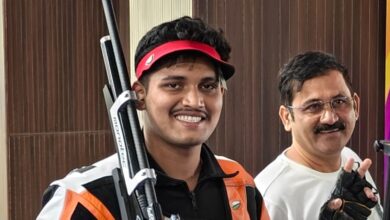Usman Khawaja’s journey: From being called a curry muncher to silencing critics with tons of runs

“F***ing curry muncher.” A frequent abuse that a very young Usman Khawaja would hear not long after he moved to Australia when he was 5.
Last week, he was not only voted as Australian Test player of the year but also picked for the biggest community-impact award for the social work he does with his Khawaja foundation for minorities, migrants, refugees, and socially-impacted kids.
In a touching speech, he would talk about how he didn’t know English and on his first day at kinder-garden, when a teacher asked him something, he turned and told his mother, “kya bol rahi hai? (what’s she saying?). And he thanked his mentor Bill Anderson for helping with cricket at Sydney Grade and running his foundation.
It hasn’t been an easy journey for Khawaja but he has soldiered on, and in the last 12 months, he has been on a run-deluge and will be one of the key batsmen on the tour of India.
His mentor Anderson remembers a 15-year old Khawaja so shy that he “would not even look you in your eye”.
“He is conscious of his background and where he came from – at the same time he is very Australian,” Anderson told The Indian Express. “Everything about him – the time he spends on video games, the social things he indulges in even though he doesn’t drink, he is always out with his team-mates. The fun things he does with them. We are all part of the environment where we grew up and it’s in Australia that he grew up.”
The cricket journey wasn’t easy though. First his academics came in the way; at one stage he broke off cricket to focus on finishing his aviation degree and become a qualified pilot. He then re-plunged into cricket in 2008 but the journey hasn’t been easy, on and off the field.
The two facets of the Usman Khawaja Foundation:
1: Allowing kids from low socio-economic backgrounds to play sport for free2: Giving grants, scholarships and things needed for kids’ education
Both close to Khawaja’s 
— 7Cricket (@7Cricket) January 30, 2023
It’s cricket that has helped shape the very idea of Australia in the 1880s when they were searching for a sense of nation. The colonies which never did anything together assembled under the umbrella of cricket and showed Australians what they could accomplish as a single entity which the squabbling colonies were unable to attain politically. They united first for cricket before uniting politically. Australia didn’t have many social and cultural narratives; it’s a modern nation, a geographical construct. But Australian cricket was also very conservative.
Australia’s social horian Peter Cashman once wrote about how the pacer Leonard Durtanovich, the son of Yugoslav immigrants, changed his surname to Pascoe and played Test cricket as Lenny Pascoe. Cashman quoted former Test seamer Geoff Lawson as saying that the Chappell brothers had “made a habit of baiting Pascoe about his ethnic origins when they faced up to him’ at domestic cricket.
In more recent times when Pakan-born Fawad Ahmed, played ODIs for Australia without an alcohol sponsor’s log on his jersey due to his religious belief, the famous Australian sports stars Doug Walters, a flamboyant batsman, and David Campese, former Australian rug union star, went after him. ‘I think if he doesn’t want to wear the team gear, he should not be part of the team. Maybe if he doesn’t want to be paid, that’s OK,” went Walters. Campese tweeted his response: ‘’Doug Walters tells Pakan born Fawad Ahmed: if you don’t like theVB uniform, don’t play for Australia. Well said Doug. Tell him to go home.’
It’s in this background that Khawaja grew up. Luckily for him, Australia too began to grow up. Those with rac views slowly became a minority. But there were other issues.
“Whenever the Australian team wasn’t successful, Uzzy would be the first person to be dropped,” his mentor Anderson told this newspaper.
“Australia traditionally had a hory. We didn’t blood too many young players. Almost very loyal to those who have already broken through. It took a long time for Uzzy to crack the Australian code. He had got a chance to play when Ricky Ponting broke a thumb and he made a promising start but Ponting came back and Uzzy had to wait for a while. He was the easiest one to drop for some reasons and that slowed his progress. That can dent your confidence as a young player who needs chances to prove themselves but he never got a consent run. It was a bit of a troublesome period – constantly in and out – but he eventually learnt to handle it with his composure and almost philosophical calmness. He never allowed himself to get down too much. All I ever said to him then was that life is full of moments – some good and some not so good and he has to keep believing in himself. There are things in life out of one’s control and selection was one of them. His response was ‘yes I understand and I will continue with the cricket dream’.”
Parents of other kids from the sub-continent told him his colour put him at a disadvantage.
“So many times I was told other subcontinental parents, ‘You will never make it, you’re not the right skin colour’. No joke. That might have been true in some respects in past eras and generations, but it just drove me more to prove them all wrong. I wasn’t going to look back in regret,” Khawaja has written in AthletesVoice. “Being racially vilified actually made me stronger in many respects. I even had a couple of kids try to fight me one day heading home from school. For no reason either! They were in my class one second and the school bell rang – the next minute I’m just about to leave the gates of my school and they are having a go at me …”
***“Religion is the most important thing in my life. Whatever I do, it’s in my back of mind whether it is right or not,” Khawaja has said. Through his teammate Ben Cutting, Khawaja met Rachel, who he would go on to marry. A catholic girl, she converted to Islam just before wedding. “He never asked me to do it but it’s something that I thought long and hard about,” Rachel has said.
Her mother reveals a bit more in a television show ‘Sixty Minutes’. “Most people were surprised and said, ‘that’s why Muslims are taking over the world because they make their girlfriends convert before marriage but those close to us, it wasn’t an issue.” Khawaja was the first Muslim that Rachel ever met and she admitted that “all I read about Muslims were wild, terrors and all that awful things”.
Even as she says that, a smiling Khawaja pulls her leg: “She first thought that I would tie my wife up in chains and keep her in dungeons!” and even as Rachel protests, he adds in jest, “Only if she deserves it” and both laugh.
It’s that sense of humour that Paddy Upton, who coached Khawaja’s T20 team in Big Bash, recalled to this newspaper. “He has a really solid grounded personality, although he is very quiet, he is one of the funniest people I have ever been in a dressing room. The one-liners and self-depreciation – he is always the butt of his own jokes – Most of them have got religious connotations, he just rips himself off, I can’t talk about it!”
Khawaja was more nervous than his wife about her conversion to Islam. “I’d also ask, ‘If something happens to me, would you still be Muslim?’ That’s an important question to me because if the answer is no, then it would’ve meant she was only converting for me, not for her. That’s not the way it should be,” he once wrote in Athletes Voice.
During the same television show, as the camera pans to a newspaper headline, ‘The first Muslim cricketer to play for Australia,” Khawaja stares at it and says quietly, “I have never liked that headline. I just wanted to play cricket”.
That he has been doing spectacularly well in the last year. An injury to Travis Head in the fourth Ashes Test in 2021 gave him a break, and he responded with a hundred. 1,020 runs have flowed at 78.46 since that comeback – and he would humorously thank Head in his acceptance speech at the last week’s Australian Cricket Awards night for getting injured. “I played that game as my last game.”
No bowler has been able to rush him in the middle since then. This is certainly Usman Khawaja’s time. As he went on talking emotionally at the awards stage, his team-mate Marnus Labuschagne, seated in the audience, jokingly gestured to him to wind up. Without batting an eyelid, Khawaja went “When the people’s champ is talking you don’t rush the people’s champ. This is my time.”







